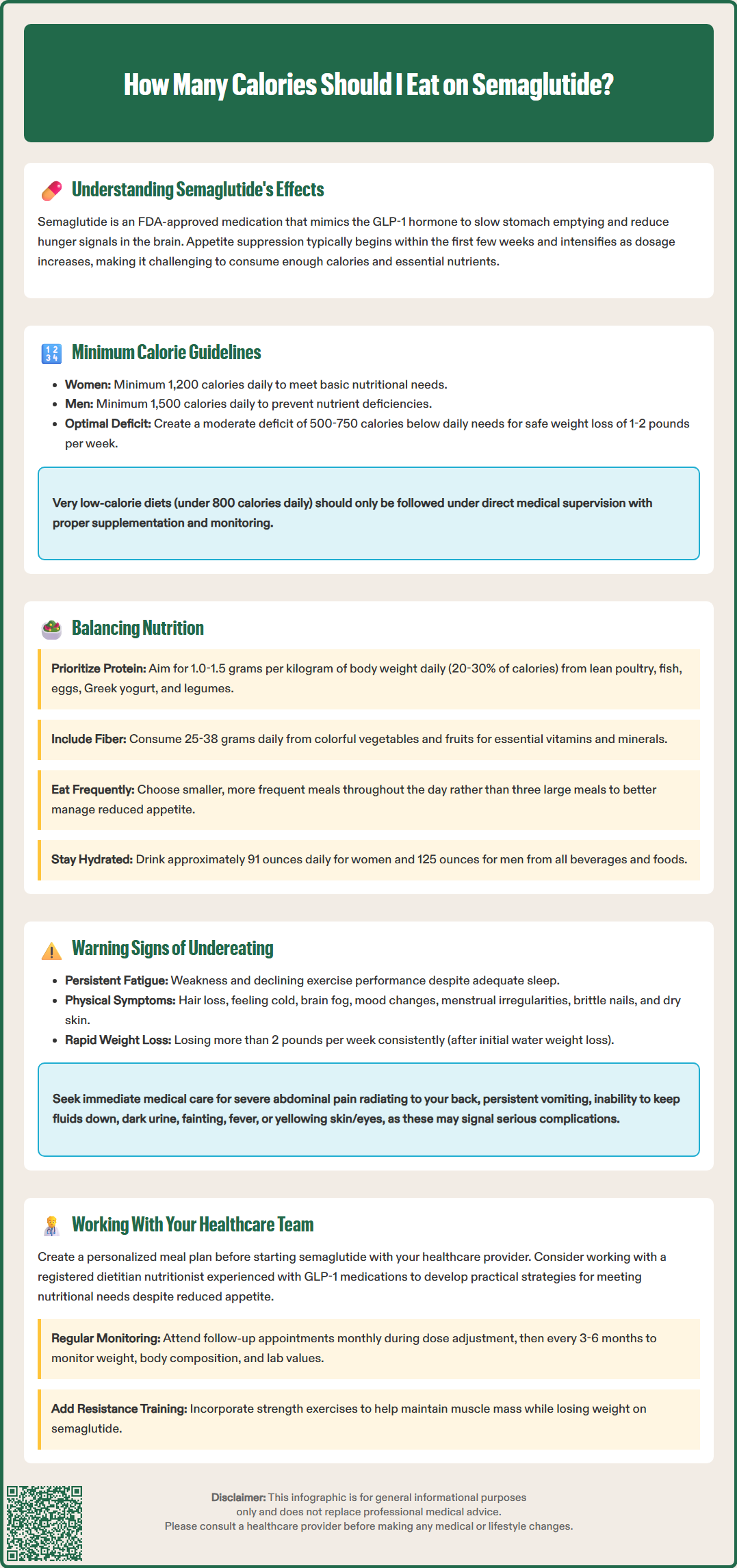LOSE WEIGHT WITH MEDICAL SUPPORT — BUILT FOR MEN
- Your personalised programme is built around medical care, not willpower.
- No generic diets. No guesswork.
- Just science-backed results and expert support.
Find out if you’re eligible

How many calories should I eat on semaglutide? This common question reflects an important nutritional challenge faced by patients taking this GLP-1 receptor agonist medication. Semaglutide significantly reduces appetite, making it easier to create the calorie deficit needed for weight loss—but this same effect can make meeting basic nutritional needs surprisingly difficult. While individual requirements vary based on factors like age, sex, activity level, and health status, most adults need a minimum of 1,200 calories daily for women and 1,500 for men to obtain adequate protein, vitamins, and minerals. Understanding how to balance effective weight loss with proper nutrition is essential for achieving sustainable results while protecting your health during semaglutide treatment.
Quick Answer: Most adults taking semaglutide should consume a minimum of 1,200 calories daily for women and 1,500 for men to meet basic nutritional needs while creating a moderate calorie deficit for safe weight loss.
The appetite-suppressing effects of semaglutide can begin within the first few weeks of treatment, though individual responses vary considerably. Many patients report feeling satisfied with smaller portions than they consumed before starting the medication. Some individuals experience early satiety—feeling full after just a few bites—while others notice a general reduction in food-related thoughts and cravings throughout the day. These effects typically intensify as the dose is gradually increased according to the prescribed titration schedule, though the delayed gastric emptying effect may attenuate with continued use.
While reduced appetite is a therapeutic benefit that supports weight loss, it also presents a nutritional challenge. The decrease in hunger can make it difficult to consume adequate calories and essential nutrients. Understanding how semaglutide affects your appetite is the first step in developing an appropriate eating strategy that supports both your weight loss goals and your overall health. If you experience persistent vomiting, inability to maintain hydration, or marked inability to meet caloric needs, especially during dose titration, contact your healthcare provider promptly.
There is no single universal calorie target for everyone taking semaglutide, as individual needs vary based on multiple factors including age, sex, height, current weight, activity level, and overall health status. However, clinical guidelines from organizations like the American Heart Association, American College of Cardiology, and The Obesity Society provide important parameters to ensure safe and effective weight loss. For most adults taking semaglutide for weight management, a minimum daily intake of 1,200 calories for women and 1,500 calories for men is generally recommended to meet basic nutritional needs and support essential bodily functions.
These minimum thresholds represent the approximate calorie levels needed to obtain adequate protein, essential fatty acids, vitamins, and minerals from food. Consuming fewer calories than these minimums for extended periods can lead to nutrient deficiencies, muscle loss, metabolic slowdown, and other health complications. The American Diabetes Association emphasizes that very low-calorie diets (typically defined as fewer than 800 calories daily) should only be undertaken under direct medical supervision with appropriate supplementation and monitoring.
Your optimal calorie intake while on semaglutide should create a moderate calorie deficit—typically 500 to 750 calories below your total daily energy expenditure—to promote steady, sustainable weight loss of approximately 1 to 2 pounds per week. This approach preserves lean muscle mass and supports long-term weight maintenance. Healthcare providers often calculate individualized targets using validated equations that account for your basal metabolic rate and activity level. It's important to note that as you lose weight, your calorie needs will decrease, and your target may need periodic adjustment. If you're also taking insulin or sulfonylureas for diabetes, you may need medication adjustments to prevent hypoglycemia when reducing calorie intake.
When appetite is significantly suppressed by semaglutide, every bite becomes nutritionally important. The challenge is not simply eating fewer calories, but ensuring that the calories you do consume are nutrient-dense and support your body's essential functions. A balanced approach prioritizes protein intake as the foundation of your eating plan. Most adults during weight loss benefit from 1.0 to 1.5 grams of protein per kilogram of body weight daily (or approximately 20-30% of total calories) to preserve lean muscle mass. High-quality protein sources include lean poultry, fish, eggs, Greek yogurt, legumes, and tofu.
Adequate protein intake is particularly critical because rapid weight loss can lead to significant muscle loss alongside fat loss. Maintaining muscle mass supports metabolic health, physical function, and long-term weight maintenance. Beyond protein, focus on incorporating a variety of colorful vegetables and fruits to obtain essential vitamins, minerals, and fiber. Aim for 25-38 grams of fiber daily from whole foods. Healthy fats from sources like avocados, nuts, olive oil, and fatty fish provide essential fatty acids and support absorption of fat-soluble vitamins (A, D, E, and K).
Many patients taking semaglutide find that eating smaller, more frequent meals works better than attempting three large meals when appetite is limited. Consider dividing your daily intake into several small meals or snacks, each containing a balance of protein, healthy fats, and complex carbohydrates. Hydration is equally important—fluid needs vary by individual, but the National Academies of Sciences, Engineering, and Medicine suggests approximately 91 ounces (2.7 liters) of total water daily for women and 125 ounces (3.7 liters) for men from all beverages and foods combined. Those with kidney disease or heart failure should follow their provider's specific fluid recommendations. Working with a registered dietitian nutritionist who has experience with GLP-1 medications can help you develop practical strategies for meeting your nutritional needs despite reduced appetite.

While semaglutide's appetite suppression facilitates weight loss, consuming inadequate calories can lead to concerning health consequences. Recognizing the warning signs of undereating is essential for maintaining your health during treatment. Persistent fatigue and weakness are often the first indicators that calorie intake is insufficient. If you feel exhausted despite adequate sleep, struggle with routine physical activities, or notice declining exercise performance, your body may not be receiving enough energy to function optimally.
Other significant warning signs include hair thinning or loss, which typically becomes noticeable two to three months after prolonged calorie restriction; cold intolerance or feeling cold even in warm environments, suggesting metabolic slowdown; difficulty concentrating or "brain fog," as your brain requires adequate glucose for optimal function; mood changes including irritability, anxiety, or depression; and menstrual irregularities in women, as reproductive hormones are sensitive to energy availability. Physical signs may include brittle nails, dry skin, dizziness upon standing, and slow wound healing.
Constipation, while a common side effect of semaglutide itself, can worsen significantly with inadequate food and fiber intake. If you're experiencing multiple of these symptoms, it's important to reassess your eating patterns. Additionally, if you're losing weight more rapidly than 2 pounds per week consistently (after the initial weeks of treatment when water weight loss is common), this may indicate excessive calorie restriction. Inadequate calorie intake can lead to adaptive thermogenesis, where your body reduces energy expenditure, potentially hindering long-term weight loss success.
Seek immediate medical attention if you experience severe persistent abdominal pain (especially if radiating to your back), persistent vomiting, inability to keep fluids down, dark urine, dizziness, fainting, fever, or yellowing of the skin or eyes. These could indicate serious conditions like pancreatitis, gallbladder disease, or severe dehydration. If you take insulin or sulfonylureas for diabetes, monitor your blood glucose closely when reducing calorie intake, as you may be at increased risk for hypoglycemia and require medication adjustments.
Developing an individualized meal plan with professional guidance is one of the most important steps you can take when starting semaglutide. Your healthcare provider should assess your baseline nutritional status, current eating patterns, weight loss goals, and any existing medical conditions before initiating treatment. This initial evaluation may include laboratory tests based on your individual risk factors, symptoms, and medical history to identify potential nutritional concerns.
A referral to a registered dietitian nutritionist (RDN) is highly valuable, particularly one experienced with GLP-1 receptor agonists. An RDN can help you develop practical meal plans that meet your nutritional needs despite reduced appetite, suggest strategies for managing common side effects like nausea and food aversions, and provide ongoing support as your needs change throughout treatment. They can also assess whether dietary intake alone meets your requirements or if targeted supplementation is appropriate for your specific situation.
Regular follow-up appointments are essential for monitoring your progress and adjusting your plan as needed. These visits typically occur monthly during the dose titration phase and then every three to six months once you reach a maintenance dose. Your provider should track not only your weight but also body composition changes, laboratory values, and overall well-being. Be honest about challenges you're experiencing with eating, including any difficulty meeting minimum calorie targets or persistent side effects affecting your nutrition.
Incorporating resistance training into your physical activity routine can help preserve lean muscle mass during weight loss. If you're of childbearing potential, discuss family planning with your provider, as semaglutide should generally be discontinued at least 2 months before a planned pregnancy according to FDA guidance. Remember that successful weight management with semaglutide is a collaborative process—your active participation and open communication with your healthcare team are essential components of achieving sustainable, healthy results.
Consuming fewer than 1,200 calories daily for women or 1,500 for men can lead to nutrient deficiencies, muscle loss, and metabolic complications. Very low-calorie diets should only be undertaken under direct medical supervision with appropriate supplementation and monitoring.
Prioritize protein at each meal by consuming high-quality sources like lean poultry, fish, eggs, Greek yogurt, and legumes. Aim for 1.0-1.5 grams of protein per kilogram of body weight daily, and consider eating smaller, more frequent meals to meet your protein needs despite reduced appetite.
Yes, as you lose weight, your total daily energy expenditure decreases, so your calorie target may need periodic adjustment. Work with your healthcare provider to recalculate your individualized calorie needs based on your current weight and activity level throughout treatment.
All medical content on this blog is created using reputable, evidence-based sources and is regularly reviewed for accuracy and relevance. While we strive to keep our content current with the latest research and clinical guidelines, it is intended for general informational purposes only.
This content is not a substitute for professional medical advice, diagnosis, or treatment. Always consult a licensed healthcare provider with any medical questions or concerns. Use of this information is at your own risk, and we are not liable for any outcomes resulting from its use.